
ESSENTIAL RECORDINGS
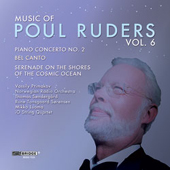
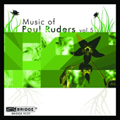
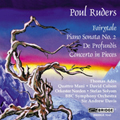
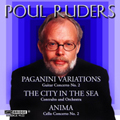
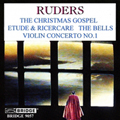
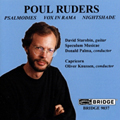
New world première recordings of recent works by the fascinating Danish composer and master
chameleon-like orchestrator Poul Ruders (1949-). One would be hard-pressed
to find another composer as versatile and versicoloured as Ruders. He's written operas, symphonies,
ballet scores, concertos for various instruments, choral and vocal works, music for solo instruments
of all kinds, works for large orchestra and pieces for solo percussion. They all bear his stamp, but at
the same time, none of his works ever seem to wear the same exterior costume. He has a gift for
discovering and exposing sonorities within an orchestra that you would never think possible, or for
juxtaposing unusual instrumental combinations that one would usually discard, and making them
fit together perfectly.
A great example of just that on this new CD is the 2004 Serenade on the Shores of the
Cosmic Ocean. A work comprised of nine short movements whose titles are based
on famous utterances by Darwin, Shakespeare, Huxley, Sagan and so on, whose subjects relate to
existence and the cosmos. And here is the surprise factor. It is scored for the unusual combination
of accordion and string quartet. I myself approached it with trepidation and prejudiced doubts to its
appeal, only to be quickly and pleasantly surprised by its attention grabbing sound that seamlessly goes
hand in hand with the subject matter. Pieces are at once shocking, haunting, mysterious, humbling or
awe-inspiring. The apt and engrossing accordion part is played by Mikko Luoma,
a Finnish musician with many many years of study, performance and conducting under his belt. The
iO String Quartet, a recently formed ensemble out of New York, not only provide
the perfect foil to the accordion, but also create that extra sound dimension that pulls you into its orbit.
They switch from frazzled hyper-energy in one piece to subliminal peace and calm in the other without
a hitch. Many of the compositions by Poul Ruders seem to relate to matters pertaining to celestial bodies
and the universe. Based on the quality of this piece, he is obviously very well inspired by the subject.
Violinist Rune Tonsgaard Sørensen plays the solo violin piece Bel Canto,
with the melancholy beauty it calls for. It was written in 2004 for a commission by the Carl Nielsen Violin Competition. Instead
of submitting the expected fast and technically demanding work usually performed at these competitions, Ruders
opted for the opposite effect with a slow, sustained, desolate piece that emphasizes the instrument's beauty of tone,
and expressive character.
The main and most recent (2010) work on this new CD, is the impressive Piano Concerto No. 2.
The concerto is a form mostly ignored by composers these days, so it's nice to come across new offerings in the genre by
composers like Ruders. It was written specifically for Vassily Primakov, the pianist on this recording.
It's performed by the orchestra who commissioned it, the Norwegian Radio Orchestra under the direction
of conductor Thomas Søndergård. It is dedicated to Becky Starobin, one of the executives
at Bridge Records, a label that has always been a strong supporter of composer Poul Ruders. It certainly
is a masterful work, imposing many technical demands on the pianist. The two outer movements are frenzied, hyper-active hubs
of activity. The final movement in particular ends with a mad dash of energy, with both the piano and orchestra seemingly jumping
hurdles to reach the end as fast as possible. My favorite movement is the middle Semplice, which to me suggests
the image of a person, alone, sitting at the piano on a dark and rainy day, stumbling upon a sad and melancholy melody that they
keep repeating simply because of its beauty, but then suddenly realize the extent of their loneliness and fall into despair. But I
believe it is best described by the following booklet notes by Malcolm MacDonald:
"The piano solo with which it begins is marked 'slightly hesitant - like a child practising'. This is at first a single slow right-hand
line, to which the child-soloist adds tentative left-hand chords, and which is then shadowed and resonated by the harp, vibraphone,
and finally the strings. All it seems is innocence and safe. Then the walls of the nursery fall down and in shocking contrast a tremendous,
jagged 'Brutale' outburst leaps out at the listener like a horde of ravening beasts. Yet somehow the simple, innocent pianism of the
movement's opening contrives to be heard again, and the beasts begin to seem like pantomime monsters. Their final grumbles are
almost placatory, the low brass playing with velvet mutes, as if the predators are moving on velvet paws, and the child-pianist
is finally left alone to finish his simple solo with his accompanying friends the vibraphone, harp and solo violin."
Whatever your perception of this movement, it leaves a profound impression that stays with you long after hearing it, and is made even
more memorable by the fact that it's nestled between two movements that reside at completely opposite ends of the emotional spectrum.
Ruders is one of those rare composers who has managed to carve a language out of a perfect balance of old an new, modern and
traditional, intellectual and emotive, systematic and evocative. A rather rare commodity these days. Highly recommended!
Jean-Yves Duperron - April 2011